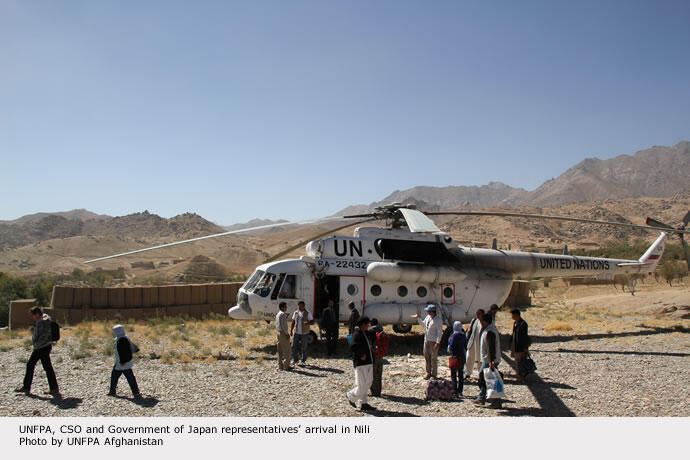United Nations Population Fund (UNFPA) Afghanistan attended the launch of Socio-demographic and Economic Survey (SDES) in Nili Daikundi on October 3rd, 2012. The official launch of SDES was organized by the Central Statistics Office (CSO) and UNFPA. The event was covered by local media in Daikundi and attended by the local authorities and the Japanese embassy in Kabul.
It is the first time that such a large scale provincial survey takes place in Afghanistan at district and village level. Socio-demographic and Economic Survey in Afghanistan is implemented by the Central Statistics Organization of Afghanistan (CSO) with the technical support of United Nations Population Fund (UNFPA) and the financial support of the Government of Japan (GoJ).
"The government of Japan supports this survey because we believe that generating, analyzing and disseminating statistical data is a critical process for sound and successful developmental policies and programs in Afghanistan. Data is an essential foundation on which both the government and the international community identify the needs on the ground as well as provide appropriate services or assistance required by local people" said Katsunori Ashida, Acting Head of Economic Section Embassy of Japan.
Lack of reliable and current population data has been one of the significant impediments to development planning in Afghanistan. To address the vacuum of vital data, CSO conceptualized the SDES in 2011, with the intent of conducting it province by province with an emphasis on collecting the socio-demographic and economic data at the district level. The survey provides socio-demographic and economic indicators that are important for sustainable development of the province.
"This survey would highlight the needs and problems of the people of this province and reflect the social and economic situation which exists in the province. The findings of this survey will be used in planning economic and social development programs to improve the lives of the residents of Daikundi province" said Mr. Pohanmal Hasibullah Mowahed, Deputy President General of CSO during the launch.
Hundreds of local people were trained as surveyors, supervisors, and for other field functions, and were deployed in survey teams to different areas. Before the survey, a detailed mapping of all houses, establishments, and institutions in every village and urban area in Daikundi Province was completed by CSO cartographers. The physical location of these units was plotted on a sketch map, with the coordinates of major establishments and important facilities such as schools, hospitals, banks, means of transportation in going to and from the village, presence of electricity, water source, and others, collected through the use of Global Positioning System (GPS) devices.The SDES is constantly supervised and monitored by Controllers. The District Statistics Officers and their assistants also monitored survey activities to ensure Surveyors/Controllers were following correct procedures for interviewing, and for cross-checking accuracy of data recording through random re-interviews.
"At present, the survey is completed in Bamiyan province and ongoing in Ghor and Daikundi provinces. UNFPA is soliciting funding support to fund the survey for the rest of the 31 provinces with four provinces in 2013, for in 2014, eight in 2015, and fifteen in 2016" said Mr. Younus Payab, UNFPA Afghanistan Representative Assistant.
In the absence of a more recent population census, the data gathered during that partial census of 1979, still form the basis for present day population estimates of Afghanistan which, according to various well recognized institutions, range from 26.0 to 32.4 million as per mid-2011.
Over the past five years, UNFPA supported a variety of initiatives for population and development:
- Infrastructural and human capacity building of the CSO
- Socio-demographic and economic survey in Bamiyan, Ghor and Daikundi
- Extensive establishments, institutions, and houses listing in Daikundi


